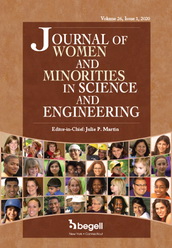
Publication de 6 numéros par an
ISSN Imprimer: 1072-8325
ISSN En ligne: 1940-431X
Indexed in
WILLING, ABLE, AND UNWANTED: HIGH SCHOOL GIRLS' POTENTIAL SELVES IN COMPUTING
 Get access
Get access
RÉSUMÉ
The shortage of women in science, technology, engineering, and mathematics (STEM) is well-documented. Many efforts address women's low representation in fields such as computing target high school girls in an effort to solidify their commitment to these fields before they enter college and create computing "potential selves." This paper describes one such effort in the rural South, the Women in Cyber Security residential camp for girls in Mississippi. Consistent with existing literature, we find girls are interested in the social relevance of various technological skills and desire hands-on, applied learning exercises. We also find girls are poorly informed about the connections between different types of skills and the jobs where such skills would be used. In fact, girls had very little idea what being a computing professional entailed. Of particular note is the girls' endorsement of single-sex skills training for at least some of the curriculum and their awareness of the barriers they would face as women in computing. Thus, girls become aware that they are unwelcome in men-dominated technology jobs even before they know what such jobs involve. Girls also identify women role models and mentors as a critical resource for negotiating and succeeding in such jobs without having experienced such relationships. Future efforts should solidify the linkages between skills and jobs, demystify computing careers, and when possible, introduce girls to senior women as role models and mentors.
-
Schimpf Corey, Andronicos Kelly, Main Joyce, Using life course theory to frame women and girls' trajectories toward (or away) from computing: Pre high-school through college years, 2015 IEEE Frontiers in Education Conference (FIE), 2015. Crossref
-
Main Joyce B., Schimpf Corey, The Underrepresentation of Women in Computing Fields: A Synthesis of Literature Using a Life Course Perspective, IEEE Transactions on Education, 60, 4, 2017. Crossref
-
Convertino Christina, Nuancing the discourse of underrepresentation: a feminist post-structural analysis of gender inequality in computer science education in the US, Gender and Education, 32, 5, 2020. Crossref